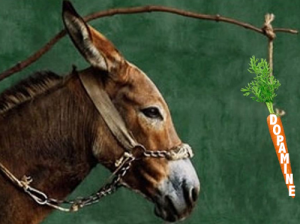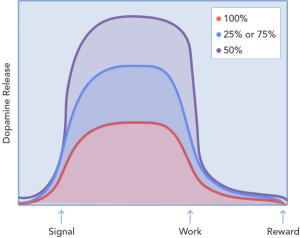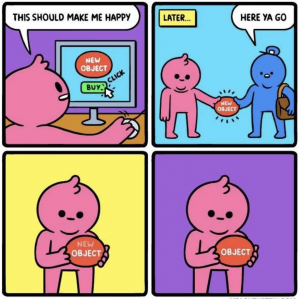Dopamine: Difference between revisions
mNo edit summary |
mNo edit summary |
||
| (6 intermediate revisions by the same user not shown) | |||
| Line 1: | Line 1: | ||
[[File:Dopamine carrot stick donkey.png|alt=Dopamine_carrot_stick_donkey|thumb|'''Figure 1'''. Dopamine | [[File:Dopamine carrot stick donkey.png|alt=Dopamine_carrot_stick_donkey|thumb|'''Figure 1'''. Dopamine gets animals to do stuff.[[File:Dopamine release curve.png|alt=Dopamine release curve|thumb|'''Figure 2'''. Dopamine release curve. Dopamine is not the goal. Dopamine release causes the progression to a goal.]][[File:Dopamine in action.png|alt=Dopamine in action|thumb|'''Figure 3'''. Dopamine in action]]]]'''Dopamine is a [[Neurochemistry|neurochemical]], that works in animal brains to incentivise them to do stuff (Figure 1)'''. | ||
When your dog sees a ball you are about to throw it causes dopamine to be released which | When your dog sees a ball you are about to throw, it causes dopamine to be released which then induces a ''craving'' to for the ball by the dog. In this sense, dopamine is not so much the actual reward but more the incentiviser as the release of dopamine only occurs in the wanting stage (see '''Figure 2'''), '''i.e.''' between seeing the ball (signal) and actually getting it (reward)<ref>'''Observations from the Neuroscience and Psychology Laboratory.''' Kent C. Berridge. An Interdisciplinary Journal of Philosophy Volume 52, 2009 - Issue 4 Pages 378-398. Published online: 12 Aug 2009, accessed on 17th July 2022 via: https://doi.org/10.1080/00201740903087359</ref>. | ||
This process is ''addictive,'' once complete, the dog looks for its next trigger, that starts the dopamine release again ('''Figure 3'''). This process could proceed infinitely however within every cycle is a downward step, a [[Negative Feedback Loop|negative feedback loop]], which means | This process is ''addictive,'' once complete, the dog looks for its next trigger, that starts the dopamine release again ('''Figure 3'''). This process could proceed infinitely however within every cycle is a downward step, a [[Negative Feedback Loop|negative feedback loop]], which means every time the dog runs and gets the ball its reserve energy reduces a notch and eventually, the dog tiredness overcomes the want for another reward and it stops. | ||
=== Desire === | === Desire === | ||
| Line 37: | Line 37: | ||
|} | |} | ||
Every negative loop, leads to a lower level which acts as a self controlling mechanisms to stop the process from going into perpetuity. However, there are some loops, which are unique to humans and their larger brains which do not have a self controlling mechanism | Every negative loop, leads to a lower level which acts as a self controlling mechanisms to stop the process from going into perpetuity. However, there are some loops, which are unique to humans and their larger brains which do not have a self controlling mechanism. These were succinctly identified by Bertrand Russell<ref>'''Bertrand Russell Reveals the 4 Human Desires That Make Our World: Acquisitiveness, Rivalry, Vanity & Love of Power.'''https://www.nobelprize.org/prizes/literature/1950/russell/lecture/</ref> as operating hierarchically: | ||
* '''Acquisitiveness''' - an excessive interest in acquiring money or material things | * [[Representative|'''Pursuit of power''']] - like [[Curse of Sisyphus|Sisyphus]] perpetually rolling his boulder up a hill, there is no satiety in power acquisition. | ||
* '''Vanity''' - self confirmation, with lack of objective verification leads to narcissistic tendencies. | |||
* '''Rivalry''' - a great many people will cheerfully face impoverishment if they can thereby secure complete ruin for their rivals. | |||
* '''Acquisitiveness''' - an excessive interest in acquiring money or material things. | |||
The main issue with | The main issue with acquisitiveness, as demonstrated in many [[Oligopolies|games]], is that it centralises power and increases inequality. Furthermore, to the detriment of us all within a [[closed system]] such as our biosphere, without infinite resources and the absence of negative feedback loops these actions could [[Ecological crisis|destroy the planet]]. Therefore it should be our imperative as a society to officially recognize [[Hoarding excessive wealth is a mental illness|hoarding excessive wealth as a form of mental illness]]. | ||
'''Reference''' | '''Reference''' | ||
<references /> | <references /> | ||
Latest revision as of 00:07, 21 November 2022
Dopamine is a neurochemical, that works in animal brains to incentivise them to do stuff (Figure 1).
When your dog sees a ball you are about to throw, it causes dopamine to be released which then induces a craving to for the ball by the dog. In this sense, dopamine is not so much the actual reward but more the incentiviser as the release of dopamine only occurs in the wanting stage (see Figure 2), i.e. between seeing the ball (signal) and actually getting it (reward)[1].
This process is addictive, once complete, the dog looks for its next trigger, that starts the dopamine release again (Figure 3). This process could proceed infinitely however within every cycle is a downward step, a negative feedback loop, which means every time the dog runs and gets the ball its reserve energy reduces a notch and eventually, the dog tiredness overcomes the want for another reward and it stops.
Desire
This is the most simplified way of seeing motivation, in humans a lot more nuanced factors can play to generate a dopamine release pathway. However, the general governing dynamic often stays the same.
| Loop | Expended energy | Remaining Energy |
| Rest | 0 | 5 |
| 1. Signal>Work>Reward | -1 | 4 |
| 2. Signal>Work>Reward | -1 | 3 |
| 3. Signal>Work>Reward | -1 | 2 |
| 4. Signal>Work>Reward | -1 | 1 |
| Rest | 0 | 0 |
Every negative loop, leads to a lower level which acts as a self controlling mechanisms to stop the process from going into perpetuity. However, there are some loops, which are unique to humans and their larger brains which do not have a self controlling mechanism. These were succinctly identified by Bertrand Russell[2] as operating hierarchically:
- Pursuit of power - like Sisyphus perpetually rolling his boulder up a hill, there is no satiety in power acquisition.
- Vanity - self confirmation, with lack of objective verification leads to narcissistic tendencies.
- Rivalry - a great many people will cheerfully face impoverishment if they can thereby secure complete ruin for their rivals.
- Acquisitiveness - an excessive interest in acquiring money or material things.
The main issue with acquisitiveness, as demonstrated in many games, is that it centralises power and increases inequality. Furthermore, to the detriment of us all within a closed system such as our biosphere, without infinite resources and the absence of negative feedback loops these actions could destroy the planet. Therefore it should be our imperative as a society to officially recognize hoarding excessive wealth as a form of mental illness.
Reference
- ↑ Observations from the Neuroscience and Psychology Laboratory. Kent C. Berridge. An Interdisciplinary Journal of Philosophy Volume 52, 2009 - Issue 4 Pages 378-398. Published online: 12 Aug 2009, accessed on 17th July 2022 via: https://doi.org/10.1080/00201740903087359
- ↑ Bertrand Russell Reveals the 4 Human Desires That Make Our World: Acquisitiveness, Rivalry, Vanity & Love of Power.https://www.nobelprize.org/prizes/literature/1950/russell/lecture/


